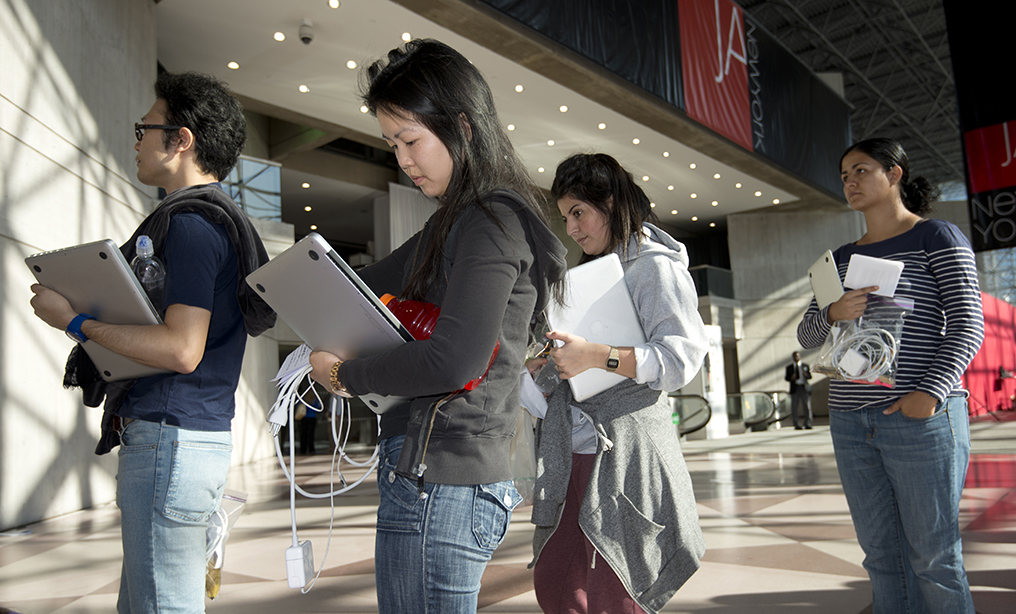NY's Transition to Uniform Bar Exam Had Little Impact on Test Performance, Report Finds
The study looked at performance on the bar exam in New York between July 2015 and July 2017. New York started administering the Uniform Bar Exam in July 2016.
August 20, 2019 at 02:59 PM
4 minute read
The original version of this story was published on New York Law Journal
 Students wait in line to take the New York State bar exam at the Jacob Javits Center in Manhattan (Photo: Monika Kozak/NYLJ)
Students wait in line to take the New York State bar exam at the Jacob Javits Center in Manhattan (Photo: Monika Kozak/NYLJ)
New York’s transition to the Uniform Bar Examination from a statewide exam three years ago has had little impact on the performance of prospective attorneys taking the test, a report from the National Conference of Bar Examiners said Tuesday.
Instead, the small increase in performance among candidates over a three-year period appeared to be attributed to how well they did in their academic career, the report said.
The study looked at performance on the bar exam in New York between July 2015 and July 2017. New York started administering the Uniform Bar Exam in July 2016.
When the New York Court of Appeals, the state’s highest court, voted to transition the state to the Uniform Bar Exam four years ago, New York became the 16th state to do so. As of May, that number had doubled.
The National Conference of Bar Examiners, in the three-year study, looked at performance on the bar exam by race, ethnicity, gender, and other background characteristics. They considered how performance in undergraduate education, law school, and the LSAT correlated with their results on the exam, for example.
Over the year following the first time the Uniform Bar Exam was administered to prospective lawyers in New York, pass rates increased, according to the report released Tuesday. But that likely had nothing to do with the new exam, the report said.
“This is not to say that the pattern was perfect, but background characteristics certainly explained at least a portion of the improvement in bar exam scores after UBE adoption, indicating that improvement in bar exam scores was likely not due to the UBE,” an executive summary of the report said.
Pass rates increased marginally over the three-year period, according to the report.
The bar exam is administered in February and July in New York. Pass rates for the February test-takers increased from 40.5% to 43.8% between 2016 and 2017, the report said. Pass rates in July, meanwhile, increased from 60.9% to 68.5% between 2015 and 2017.
Average bar exam scores increased from 258.20 in February 2016 to 260.62 the following year, and 273.52 in July 2015 to 281.67 in July 2017, according to the report.
Scores and pass rates tended to increase for each group, separated by gender and race/ethnicity, between each one-year period, according to the report.
One notable exception, the report said, was when scores and pass rates for the black/African American group increased less than other groups between July 2015 and July 2016, but then increased more than any other group in July 2017.
Statistically, the Caucasian/white group tended to have the highest average scores on the bar exam, followed by the Asian/Pacific Islander group. Test-takers that identified as male tended to have higher pass rates than their female counterparts, the report said.
Chief Judge Janet DiFiore said in a statement with the report that the amount of data collected through the study, which is nearly 300 pages, was important for the state court system to understand because of the impact of transitioning to a new bar exam.
“I want to thank the National Conference of Bar examiners for conducting this careful and exhaustive study on our behalf,” DiFiore said. “This is an important component in our examination of the impact of adoption of the UBE on candidates seeking admission to the bar in New York.”
The full report is available on the New York State Board of Law Examiners website.
READ MORE:
‘Old MacDonald’ Had A Tort Claim: NY Judge Remixes Nursery Rhymes for Bar Prep
Minds Over Matters: An Examination of Mental Health in the Legal Profession
This content has been archived. It is available through our partners, LexisNexis® and Bloomberg Law.
To view this content, please continue to their sites.
Not a Lexis Subscriber?
Subscribe Now
Not a Bloomberg Law Subscriber?
Subscribe Now
NOT FOR REPRINT
© 2025 ALM Global, LLC, All Rights Reserved. Request academic re-use from www.copyright.com. All other uses, submit a request to [email protected]. For more information visit Asset & Logo Licensing.
You Might Like
View All
Chicago Law Requiring Women, Minority Ownership Stake in Casinos Is Unconstitutional, New Suit Claims
5 minute read
Free Microsoft Browser Extension Is Costing Content Creators, Class Action Claims
3 minute read
Fired by Trump, EEOC's First Blind GC Lands at Nonprofit Targeting Abuses of Power
3 minute read
Indian Law Firm Cyril Amarchand Rolls Out AI Strategy, Adopts Suite of AI Tools
Trending Stories
- 1Haynes and Boone Expands in New York With 7-Lawyer Seward & Kissel Fund Finance, Securitization Team
- 2Upstart Insurer That's Wowing Industry Hires AIG Legal Exec to Help Guide Global Expansion
- 3Connecticut Lawyers in Spotlight for Repping FBI Agents
- 4SEC Sued for Failing to Reveal Records Involving Simpson Thacher Attorney
- 5Lawsuit Accuses University of California of Racial Discrimination in Admissions
Who Got The Work
J. Brugh Lower of Gibbons has entered an appearance for industrial equipment supplier Devco Corporation in a pending trademark infringement lawsuit. The suit, accusing the defendant of selling knock-off Graco products, was filed Dec. 18 in New Jersey District Court by Rivkin Radler on behalf of Graco Inc. and Graco Minnesota. The case, assigned to U.S. District Judge Zahid N. Quraishi, is 3:24-cv-11294, Graco Inc. et al v. Devco Corporation.
Who Got The Work
Rebecca Maller-Stein and Kent A. Yalowitz of Arnold & Porter Kaye Scholer have entered their appearances for Hanaco Venture Capital and its executives, Lior Prosor and David Frankel, in a pending securities lawsuit. The action, filed on Dec. 24 in New York Southern District Court by Zell, Aron & Co. on behalf of Goldeneye Advisors, accuses the defendants of negligently and fraudulently managing the plaintiff's $1 million investment. The case, assigned to U.S. District Judge Vernon S. Broderick, is 1:24-cv-09918, Goldeneye Advisors, LLC v. Hanaco Venture Capital, Ltd. et al.
Who Got The Work
Attorneys from A&O Shearman has stepped in as defense counsel for Toronto-Dominion Bank and other defendants in a pending securities class action. The suit, filed Dec. 11 in New York Southern District Court by Bleichmar Fonti & Auld, accuses the defendants of concealing the bank's 'pervasive' deficiencies in regards to its compliance with the Bank Secrecy Act and the quality of its anti-money laundering controls. The case, assigned to U.S. District Judge Arun Subramanian, is 1:24-cv-09445, Gonzalez v. The Toronto-Dominion Bank et al.
Who Got The Work
Crown Castle International, a Pennsylvania company providing shared communications infrastructure, has turned to Luke D. Wolf of Gordon Rees Scully Mansukhani to fend off a pending breach-of-contract lawsuit. The court action, filed Nov. 25 in Michigan Eastern District Court by Hooper Hathaway PC on behalf of The Town Residences LLC, accuses Crown Castle of failing to transfer approximately $30,000 in utility payments from T-Mobile in breach of a roof-top lease and assignment agreement. The case, assigned to U.S. District Judge Susan K. Declercq, is 2:24-cv-13131, The Town Residences LLC v. T-Mobile US, Inc. et al.
Who Got The Work
Wilfred P. Coronato and Daniel M. Schwartz of McCarter & English have stepped in as defense counsel to Electrolux Home Products Inc. in a pending product liability lawsuit. The court action, filed Nov. 26 in New York Eastern District Court by Poulos Lopiccolo PC and Nagel Rice LLP on behalf of David Stern, alleges that the defendant's refrigerators’ drawers and shelving repeatedly break and fall apart within months after purchase. The case, assigned to U.S. District Judge Joan M. Azrack, is 2:24-cv-08204, Stern v. Electrolux Home Products, Inc.
Featured Firms
Law Offices of Gary Martin Hays & Associates, P.C.
(470) 294-1674
Law Offices of Mark E. Salomone
(857) 444-6468
Smith & Hassler
(713) 739-1250








